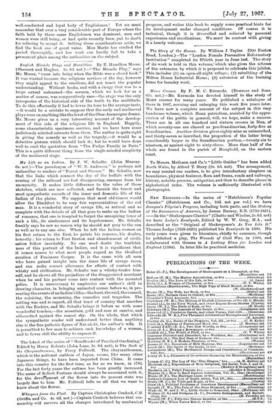English Miracle Plays and Moralities. By E. Hamilton Moore. (Sherratt
and Hughes. 3s. 6d. net.)—" The Miracle Play," says Mr. Moore, "Caine into being when the Bible was a closed book." It was wanted because the religious services of the day, however they might appeal to the emotions, did not touch the popular understanding. Without books, and with a clergy that was to a large extent unlearned—the sermon, which we look for as a matter of course, was comparatively rare—the stage was the only interpreter of the historical side of the truth to the multitude. To do this effectually it had to lower its tone to the average taste, —it would be a mistake to suppose that the early and mediaeval plays were on anything like the level of the Ober-Ammergau drama. Mr. Moore gives us a very interesting account of the develop- ment of this side of the religious life in England. Happily, some characteristic specimens survive, and we have here some judiciously selected extracts from them. The author is quite right in giving the comedy as well as the tragedy,—it would be a defective picture which should lack it ; but he would have done well to omit the quotation from "The Fudge Family in Paris." This is a quite different thing from the single-minded simplicity of the mediaeval stage.






































 Previous page
Previous page